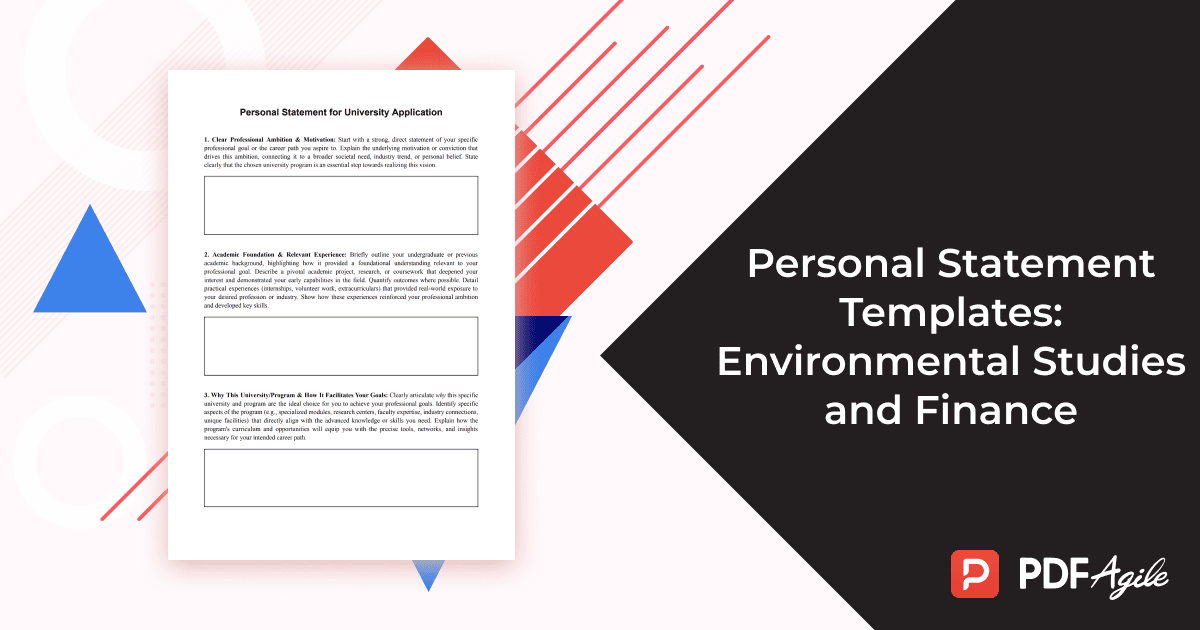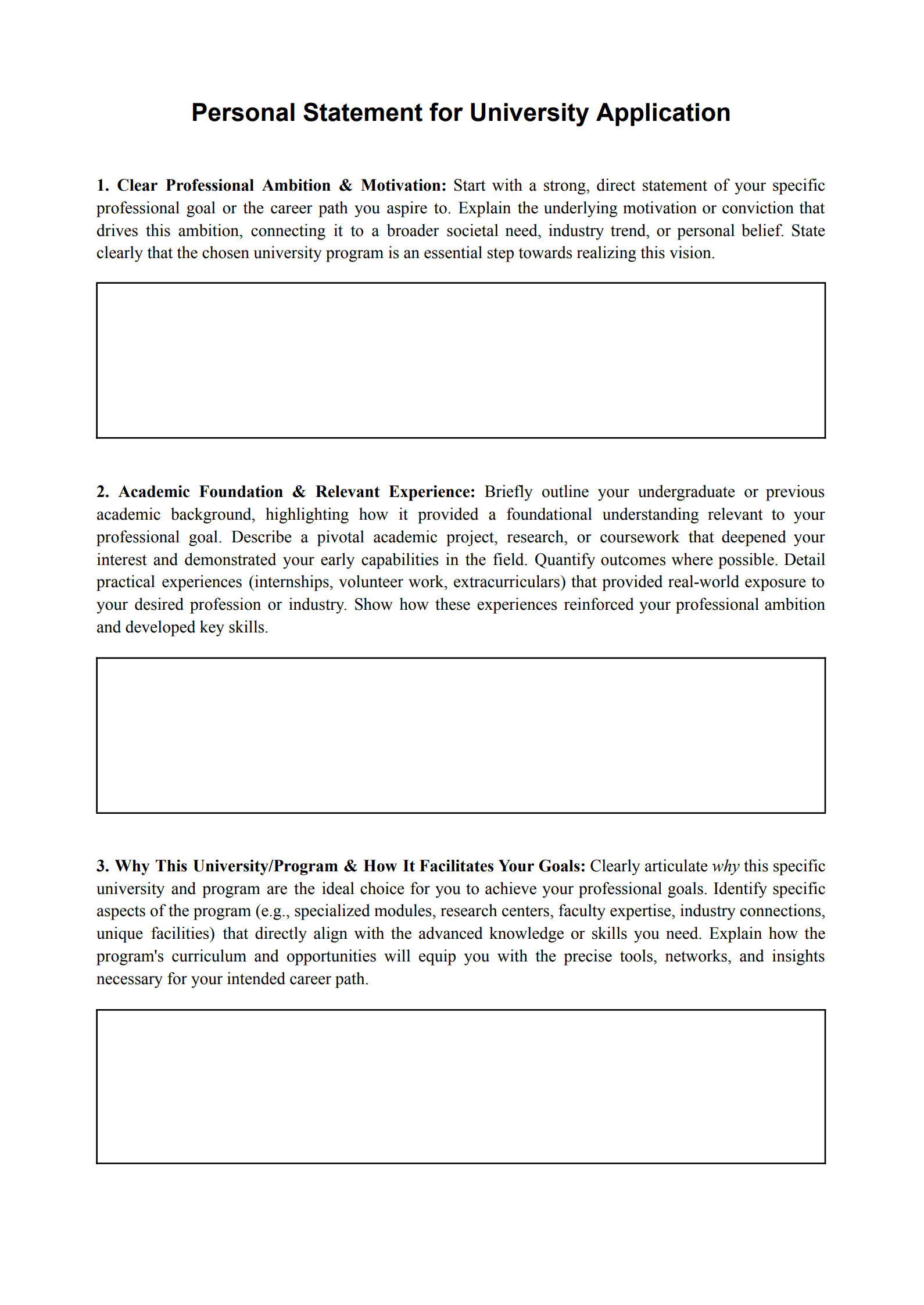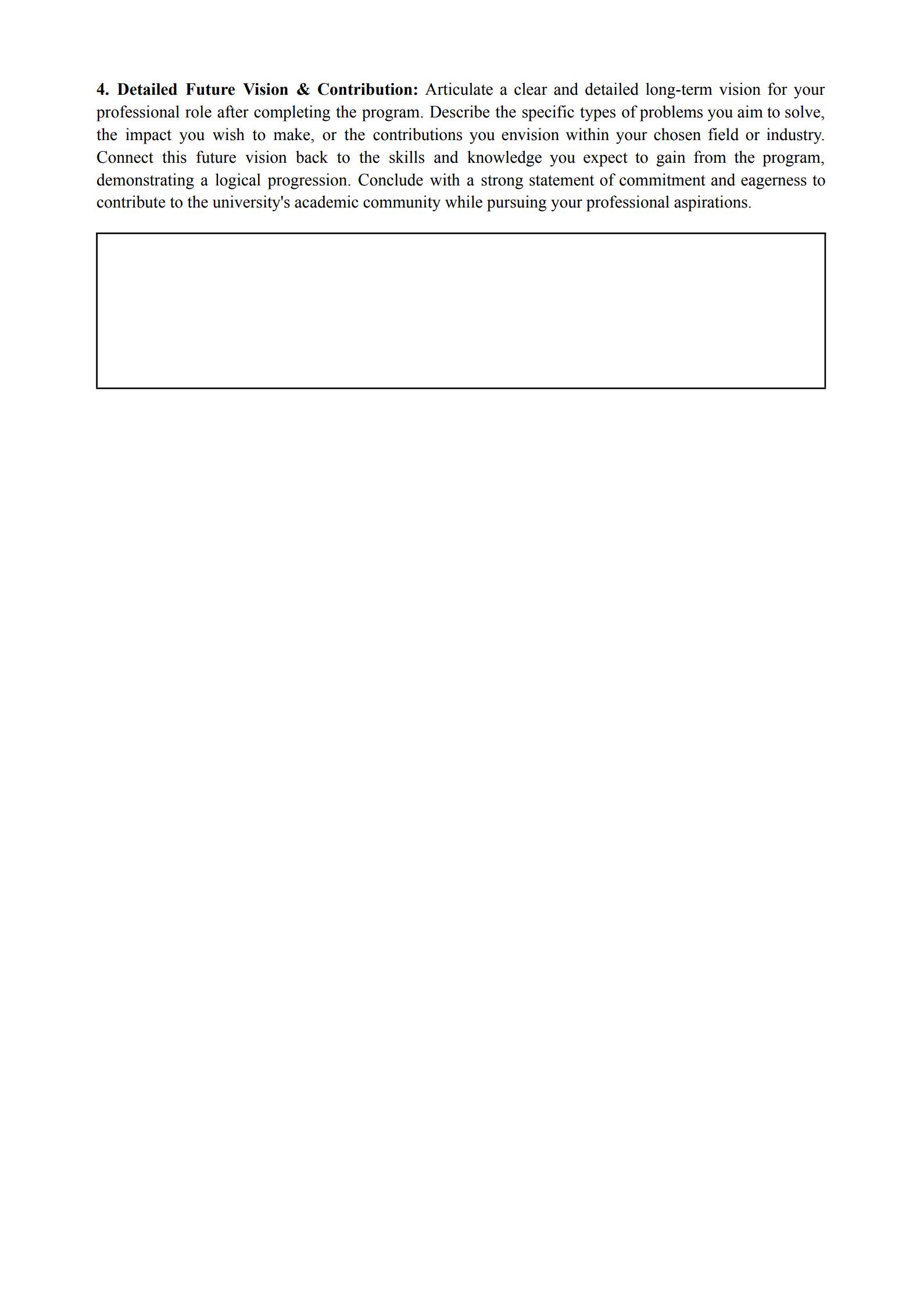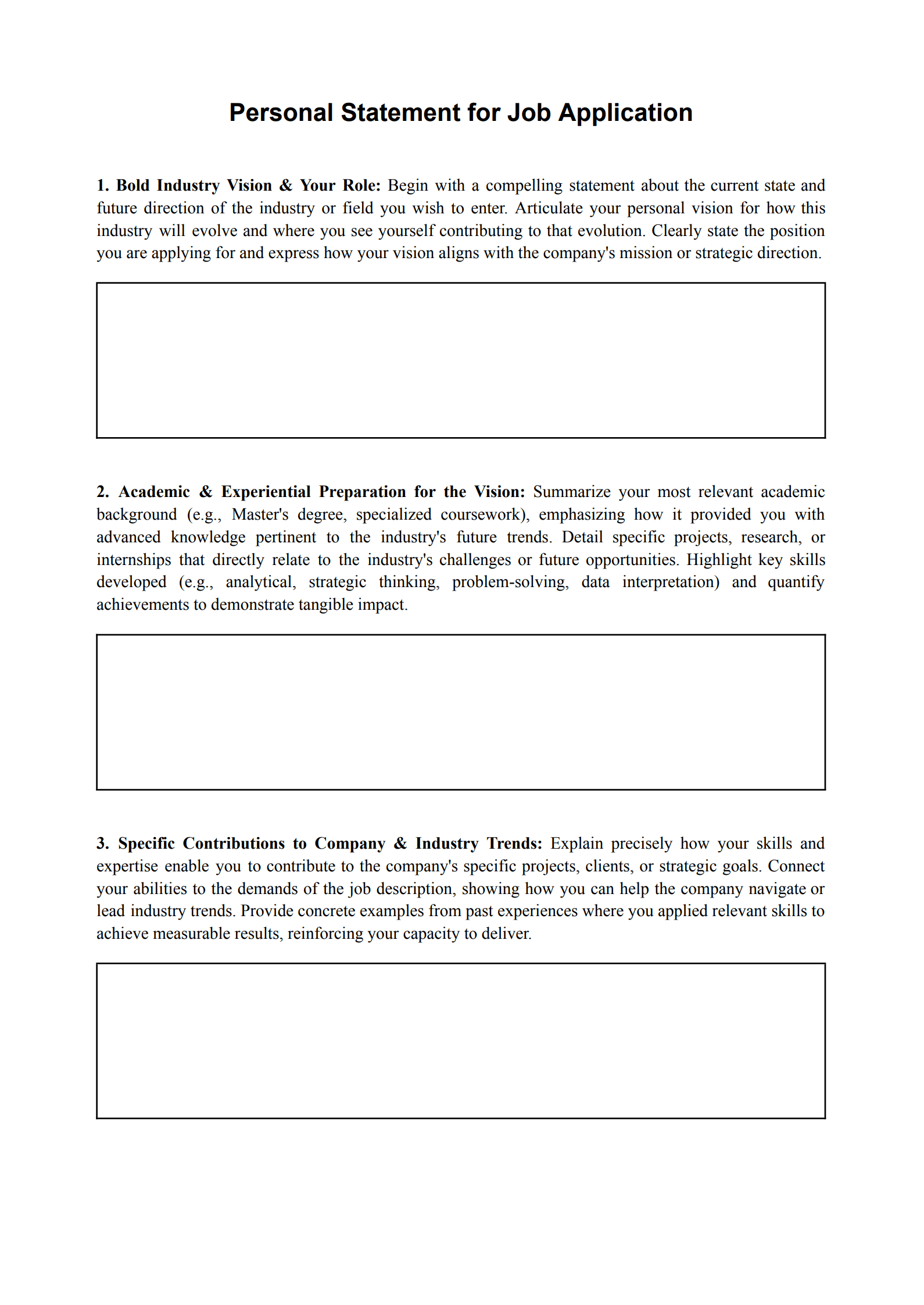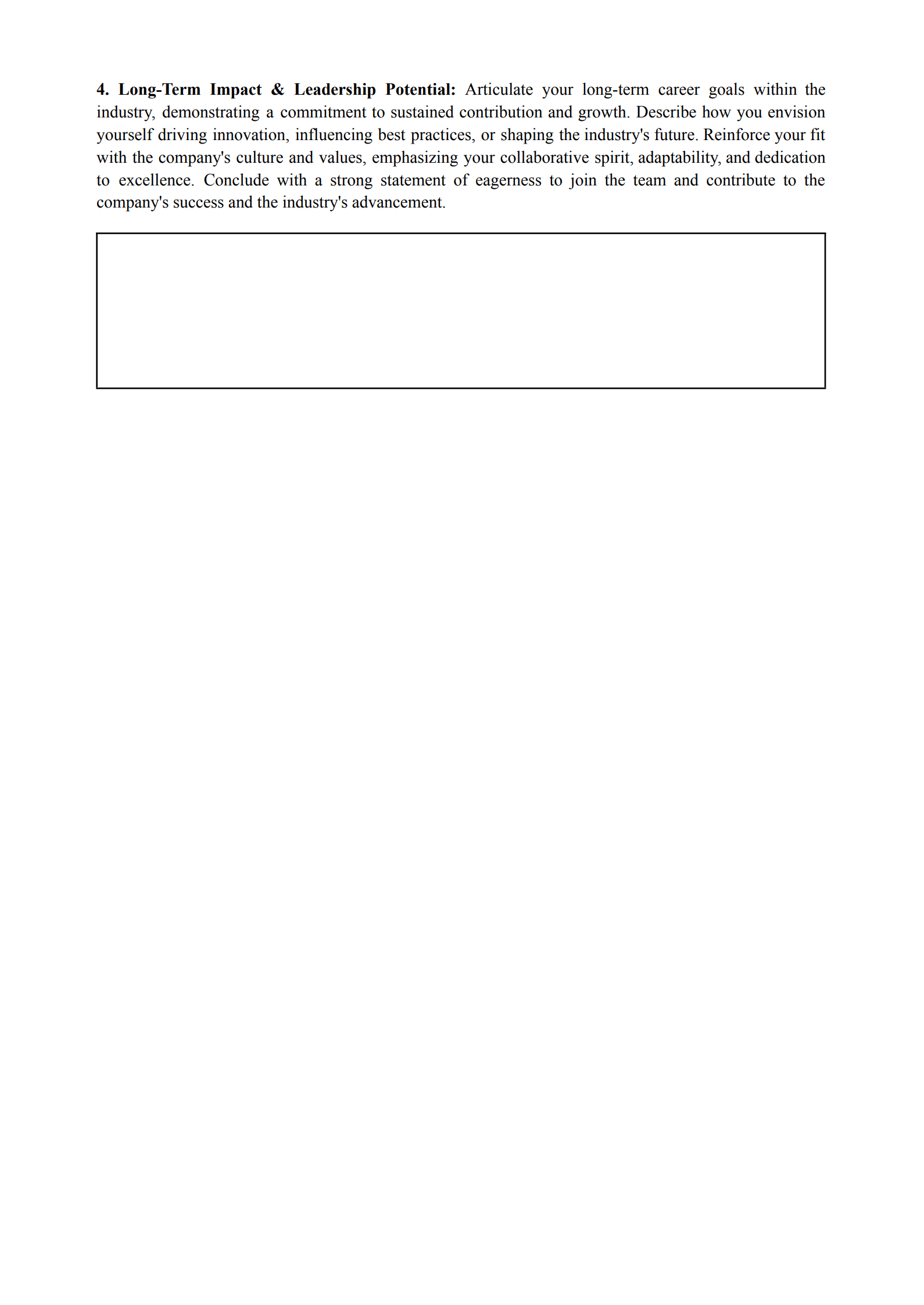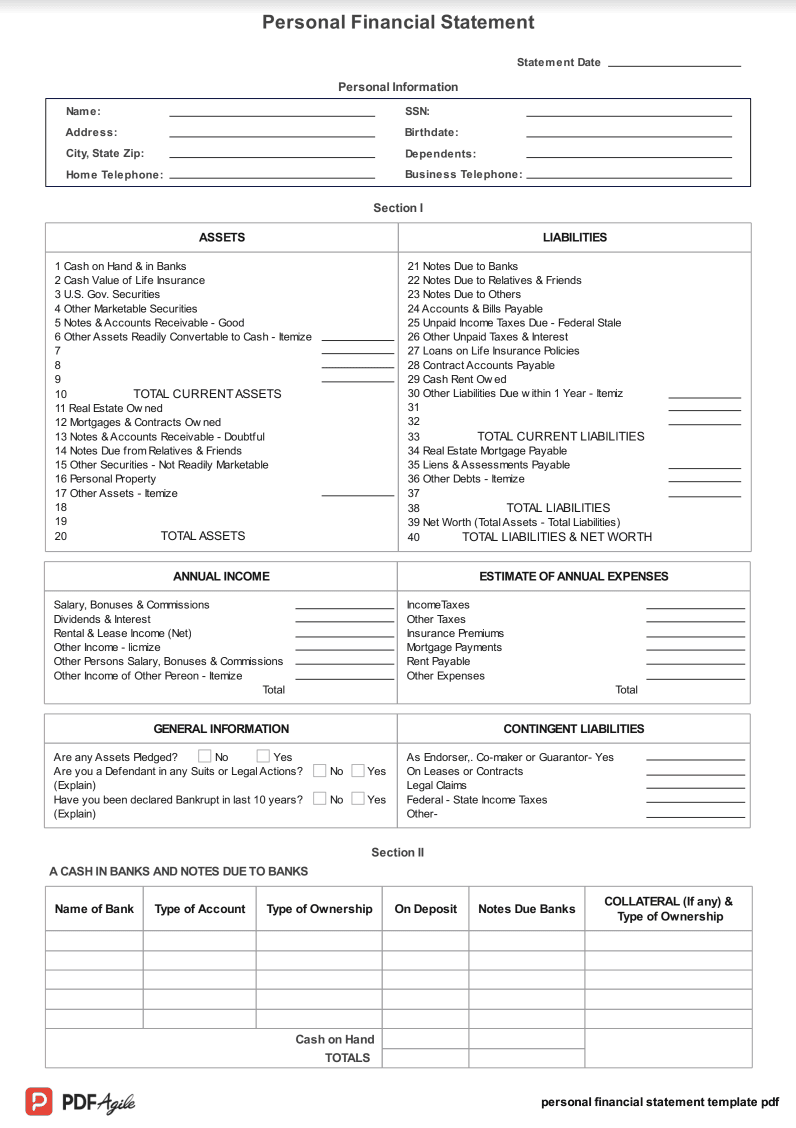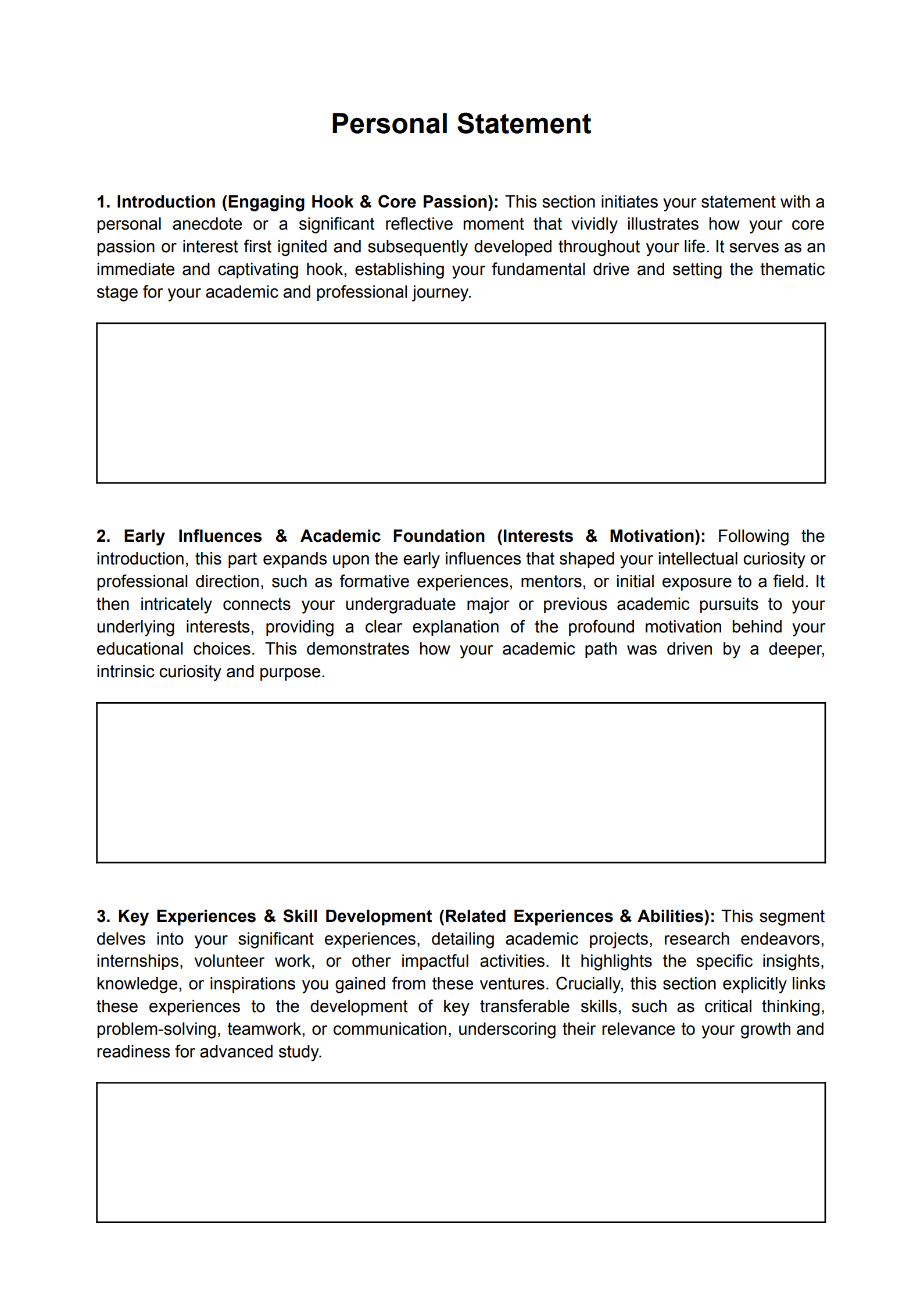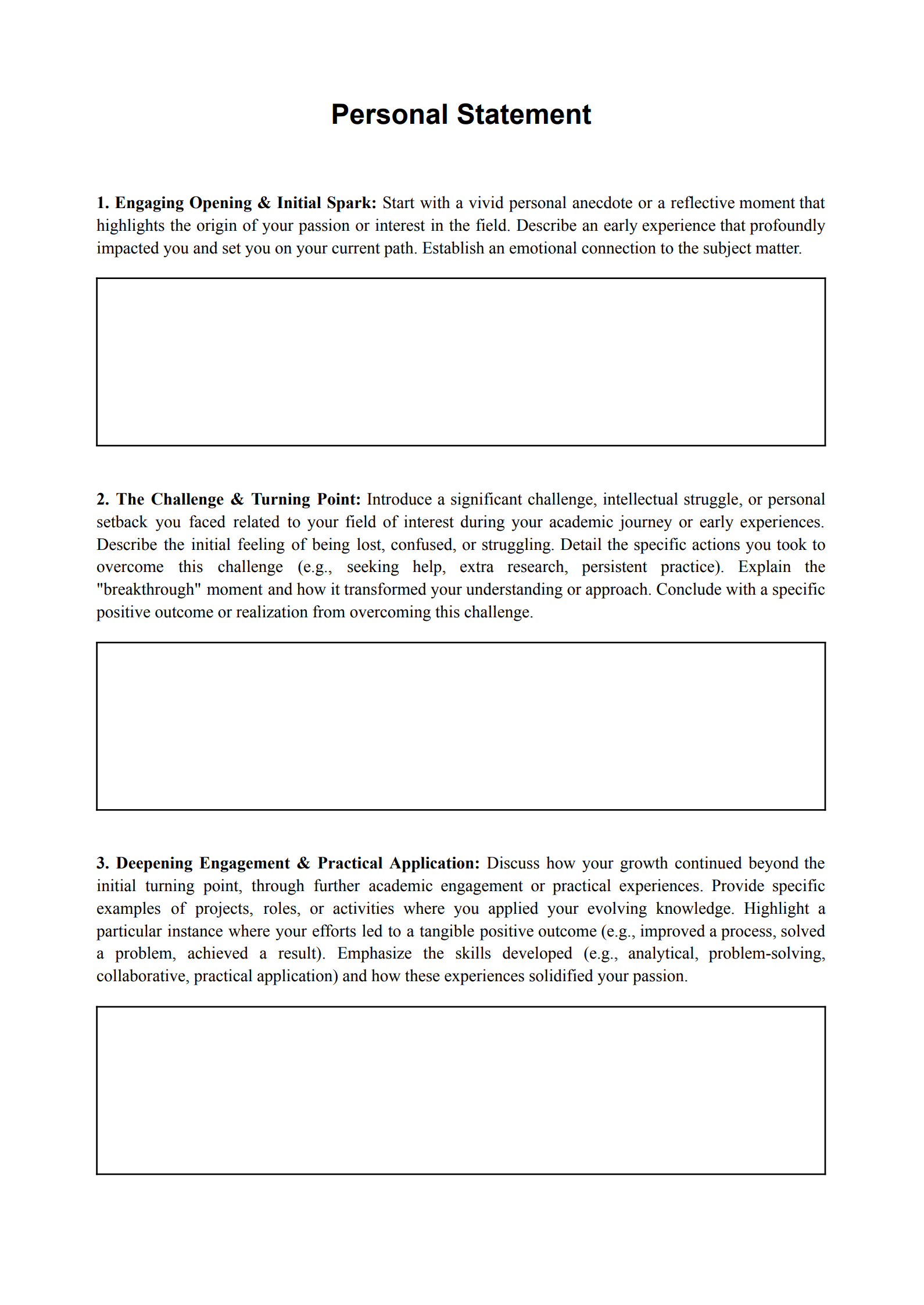In the competitive arenas of university admissions and job applications, a personal statement is your prime opportunity to articulate not just where you've been, but precisely where you're going. Among the various approaches, the "Goal-Oriented Vision" style stands out as a particularly effective way to demonstrate foresight, ambition, and a clear understanding of your chosen field's trajectory.
What Characteristics Does This Type of Personal Statement Have and Why Does It Optimize Your Personal Statement?
A personal statement characterized by a "Goal-Oriented Vision" is fundamentally forward-looking. It distinguishes itself by:
- Clarity of Purpose: It begins with a strong, unambiguous statement of your professional ambition or long-term career goal. This immediately signals to the reader that you have a clear direction.
- Strategic Alignment: It meticulously connects your past experiences and academic pursuits to your future aspirations, demonstrating a logical and deliberate path. This shows thoughtful planning rather than haphazard choices.
- Industry Awareness: It integrates an understanding of current trends, challenges, and future directions within your chosen field or industry. This proves you've done your research and are genuinely invested in the sector's evolution.
- Solution-Oriented Mindset: It often frames your ambition in terms of the problems you wish to solve or the contributions you aim to make, positioning you as a proactive and valuable asset.
- Future Impact Emphasis: It focuses on the tangible impact you intend to have, whether on a specific organization, a broader community, or the industry at large.
This style optimizes your personal statement by:
- Demonstrating Maturity and Focus: It conveys that you are a serious, driven individual with a well-thought-out career plan.
- Highlighting Fit: By aligning your vision with the institution's program offerings or the company's strategic goals, you make a compelling case for why you are the perfect match.
- Creating a Memorable Impression: A clear, ambitious vision is often more impactful and memorable than a mere recitation of past achievements. It shows you're not just looking for a degree or a job, but a platform to achieve significant goals.
- Showcasing Proactive Thinking: It illustrates your ability to think strategically about your career and the future of your field, a highly valued trait in both academia and industry.
Real-World Journeys: From Academia to Industry
To powerfully illustrate the "Goal-Oriented Vision" approach, let's examine two distinct professional trajectories. Our first example, Applicant A, is an individual deeply committed to environmental stewardship. Their journey began with undergraduate studies in Environmental Studies, leading to a clear ambition to become a leading Sustainability Consultant. Their personal statements meticulously articulated this professional goal, demonstrating how their academic pursuits and practical experiences were strategically aligned to achieve it.
Personal Statement for Master's in Environmental Management
My professional ambition is unequivocally clear: to become a leading sustainability consultant, guiding organizations through the complexities of environmental stewardship and enabling them to thrive in an increasingly resource-constrained and climate-conscious world. This vision is not merely an aspiration but a direct culmination of my undergraduate studies in Environmental Studies and a deep-seated conviction that innovative, actionable solutions are paramount to addressing our planet's most pressing ecological challenges. I believe that a Master's in Environmental Management is the essential next step to acquire the advanced interdisciplinary knowledge and practical tools necessary to translate this vision into tangible impact.
My undergraduate degree provided me with a comprehensive understanding of ecological principles, environmental policy, and the socio-economic dimensions of sustainability. I delved into topics ranging from climate change science and biodiversity conservation to environmental law and sustainable urban planning. A pivotal moment in my academic journey was a research project on corporate water footprint analysis. I meticulously analyzed the water usage of three different manufacturing companies in the region, identifying inefficiencies and proposing alternative water management strategies. This project, while challenging due to the complexity of data collection and stakeholder engagement, solidified my understanding of how environmental issues intersect with business operations. It also highlighted the critical need for professionals who can bridge the gap between scientific understanding and practical, economically viable solutions. My final report proposed a framework that, if implemented, could lead to an estimated 15% reduction in industrial water consumption for similar companies, demonstrating my early capacity for impactful problem-solving.
Beyond theoretical knowledge, I actively sought opportunities to gain practical exposure to the field. During a summer internship with a local environmental non-profit, I assisted in developing community-based recycling programs. This involved conducting public outreach, analyzing waste audit data, and collaborating with municipal authorities. I was responsible for surveying over 200 households to assess recycling habits and identify barriers, contributing to a program redesign that saw a 10% increase in participation rates within its pilot phase. This experience taught me the nuances of stakeholder engagement and the importance of tailoring solutions to specific contexts. Furthermore, my role as a project assistant for a university initiative focused on campus energy efficiency provided hands-on experience in data analysis and proposal development. I helped audit energy consumption across several campus buildings, contributing to a report that identified potential savings of $50,000 annually through LED lighting upgrades and HVAC optimization. These experiences collectively reinforced my desire to work at the nexus of environmental science and practical implementation, driving real-world change.
My decision to pursue a Master's in Environmental Management at [University Name] is driven by a clear understanding of what I need to achieve my professional goal. While my undergraduate studies provided a strong foundation, I recognize the need for advanced expertise in areas such as environmental impact assessment, lifecycle analysis, sustainable supply chain management, and corporate sustainability reporting – all core components of your distinguished program. I am particularly drawn to [University Name]'s [mention a specific research center, e.g., "Centre for Environmental Policy"] and the work of Professor [mention a specific professor whose research aligns with your interests, e.g., "Dr. Jane Doe's research on circular economy models"]. I am eager to leverage your program's blend of scientific rigor and practical application, including its strong industry connections and case-study based learning, to develop the strategic thinking and analytical skills essential for a successful sustainability consultant. I am confident that the advanced coursework and opportunities for applied research will equip me with the comprehensive toolkit required to navigate complex environmental regulations, develop robust sustainability strategies, and advise diverse clients effectively.
My long-term vision is to specialize in advising multinational corporations on their transition to net-zero emissions and the implementation of circular economy principles. I aim to help businesses not only reduce their environmental footprint but also unlock new avenues for innovation and competitive advantage through sustainable practices. I envision myself leading projects that involve comprehensive sustainability audits, developing bespoke environmental management systems, and facilitating stakeholder dialogues to foster collective action. I am committed to contributing to a future where economic prosperity and ecological health are not mutually exclusive but intrinsically linked. The Master's in Environmental Management at [University Name] represents the critical next step in realizing this ambitious yet vital professional journey. I am prepared to dedicate myself fully to the rigorous demands of this program and am excited by the prospect of contributing to your vibrant academic community.
Personal Statement for Sustainability Consultant - [Consulting Firm Name, e.g., Deloitte, EY, ERM]
The global imperative for sustainability is no longer a distant ideal but an immediate, strategic necessity for every industry. I envision a future where businesses seamlessly integrate environmental and social responsibility into their core operations, not merely as compliance, but as a fundamental driver of innovation, resilience, and long-term value. As a highly motivated and analytically driven professional with a Master's in Environmental Management, I am eager to contribute to [Consulting Firm Name]'s mission of guiding clients through this transformative journey, leveraging my expertise to shape a more sustainable industrial landscape.
My academic foundation and practical experiences have meticulously prepared me to contribute to this evolving industry. My Master's in Environmental Management provided me with advanced knowledge in critical areas such as environmental impact assessment, lifecycle analysis, sustainable supply chain management, and corporate sustainability reporting. This academic rigor is complemented by a deep understanding of the regulatory frameworks and market drivers shaping corporate sustainability. For instance, my master's thesis focused on developing a comprehensive framework for assessing the climate resilience of supply chains in the manufacturing sector, a project that involved analyzing data from over 50 global companies and proposing adaptive strategies that could reduce climate-related disruptions by an estimated 20%. This project honed my ability to conduct in-depth research, synthesize complex information, and develop actionable, data-driven recommendations.
My practical experience further solidifies my readiness to excel as a Sustainability Consultant. During my internship with a leading environmental non-profit, I played a key role in a community-based recycling initiative. I conducted waste audits and stakeholder surveys, engaging with over 200 households to understand behavioral patterns. My analysis and recommendations contributed to a program redesign that saw a 10% increase in participation rates within its pilot phase, demonstrating my ability to translate insights into tangible behavioral change. Furthermore, as a project assistant for a university initiative, I helped audit campus energy consumption, identifying potential savings of $50,000 annually through specific efficiency upgrades. These experiences have equipped me with a strong understanding of both the technical and human elements of sustainability implementation.
I am particularly drawn to [Consulting Firm Name]'s reputation for [mention something specific about the firm, e.g., "its innovative approach to circular economy solutions," "its leadership in ESG strategy," "its global reach and diverse client portfolio"]. My vision aligns perfectly with your firm's commitment to driving systemic change. I am adept at translating complex environmental data into clear, actionable business insights, a skill I honed through numerous academic projects and presentations. I am proficient in using various analytical tools for data visualization and reporting, and I thrive in collaborative, fast-paced environments where interdisciplinary problem-solving is key. My ability to engage effectively with diverse stakeholders, from corporate executives to community members, ensures that solutions are not only technically sound but also practically implementable.
I am eager to apply my expertise in developing bespoke sustainability strategies, conducting comprehensive environmental assessments, and advising clients on their journey towards net-zero and beyond. I envision contributing to projects that help companies integrate ESG factors into their core business models, optimize resource efficiency, and build resilient, future-proof operations. My long-term goal is to become a thought leader in sustainable business transformation, helping to shape industry standards and drive widespread adoption of truly regenerative practices. I am confident that my blend of advanced academic knowledge, practical experience, and a visionary outlook on sustainability makes me an ideal candidate to contribute significantly to [Consulting Firm Name]'s continued success in this vital field.
Our second example, Applicant B, is driven by the transformative power of finance. Their path started with a robust undergraduate degree in Finance, evolving into a focused aspiration to become a key ESG (Environmental, Social, and Governance) Investment Analyst. Their statements showcased a clear vision for how they would leverage financial acumen to drive sustainable capital allocation and foster responsible corporate behavior within the financial sector.
Personal Statement for Master's in Sustainable Finance
My professional aspiration is to become a leading ESG (Environmental, Social, and Governance) Investment Analyst, leveraging financial acumen to drive sustainable capital allocation and foster responsible corporate behavior. This ambition stems from a profound belief in the power of finance to effect positive change, a conviction solidified throughout my undergraduate studies in Finance. I see the Master's in Sustainable Finance as the indispensable next step to acquire the specialized knowledge, analytical tools, and ethical framework required to navigate the complexities of sustainable investing and make a tangible impact on global capital markets.
My undergraduate degree provided me with a robust foundation in financial theory, market analysis, and investment strategies. I gained comprehensive knowledge in areas such as corporate finance, portfolio management, risk assessment, and financial modeling. A defining moment in my academic journey was a capstone project where I analyzed the financial performance of companies with strong ESG ratings versus those with lower ratings. I meticulously collected and processed financial data alongside ESG scores from various databases, building regression models to identify correlations. This project, while challenging due to the nascent nature of comprehensive ESG data, deepened my understanding of how non-financial factors can materially impact long-term financial returns. My final presentation demonstrated that companies with high ESG scores consistently outperformed their industry peers by an average of 5% annually over a five-year period, highlighting the growing financial materiality of sustainability. This experience solidified my resolve to pursue a career at the intersection of finance and sustainability.
Beyond my coursework, I actively sought opportunities to apply my financial knowledge in practical settings. During a summer internship with a regional investment firm, I assisted portfolio managers in conducting market research and due diligence. I was responsible for compiling company profiles and analyzing financial statements, contributing to investment recommendations for clients. More specifically, I initiated a small independent research project to evaluate the ESG disclosures of companies within our firm's mid-cap equity portfolio, identifying potential risks and opportunities that were not captured by traditional financial metrics. My findings led to a recommendation to divest from one company due to significant environmental liabilities, a recommendation that was later validated when the company faced regulatory fines, demonstrating my early ability to identify and assess ESG-related financial risks. Furthermore, my participation in the university's Investment Club, where I managed a portion of the club's virtual portfolio, allowed me to experiment with integrating ESG criteria into stock selection, leading to a portfolio that generated 2% higher returns than the club's conventional benchmark over a semester. These experiences collectively reinforced my desire to specialize in sustainable finance.
My decision to pursue a Master's in Sustainable Finance at [University Name] is driven by a clear understanding of what I need to achieve my professional goal. While my undergraduate studies provided a strong financial foundation, I recognize the need for advanced expertise in areas such as impact investing, climate risk modeling, green bonds, and advanced ESG data analytics – all core components of your distinguished program. I am particularly drawn to [University Name]'s [mention a specific research center, e.g., "Centre for Sustainable Finance"] and the work of Professor [mention a specific professor whose research aligns with your interests, e.g., "Dr. John Smith's research on climate transition finance"]. I am eager to leverage your program's blend of rigorous financial theory and practical application in sustainable investing, including its strong industry connections and access to real-world case studies, to develop the specialized analytical skills and ethical framework essential for a successful ESG Investment Analyst. I am confident that the advanced coursework and opportunities for applied research will equip me with the comprehensive toolkit required to assess ESG performance, integrate it into valuation models, and advise institutional investors effectively.
My long-term vision is to become a key player in shaping responsible capital markets. I aim to specialize in analyzing climate-related financial risks and opportunities, guiding institutional investors towards portfolios that not only generate competitive returns but also contribute positively to environmental and social outcomes. I envision myself leading research initiatives that develop new methodologies for ESG integration, influencing investment strategies, and fostering greater transparency in corporate sustainability reporting. I am committed to demonstrating that financial success and sustainable impact are mutually reinforcing. The Master's in Sustainable Finance at [University Name] represents the critical next step in realizing this ambitious yet vital professional journey. I am prepared to dedicate myself fully to the rigorous demands of this program and am excited by the prospect of contributing to your vibrant academic community.
Personal Statement for ESG Investment Analyst - [Financial Firm Name, e.g., BlackRock, Sustainalytics, Fidelity Investments]
The financial landscape is undergoing a profound transformation, with Environmental, Social, and Governance (ESG) factors rapidly moving from niche considerations to fundamental drivers of investment strategy and corporate value. I envision a future where capital markets are inherently sustainable, where investment decisions are meticulously informed by a holistic understanding of both financial performance and societal impact. As a highly analytical and ethically driven professional with a Master's in Sustainable Finance, I am eager to contribute to [Financial Firm Name]'s leadership in this evolving domain, leveraging my expertise to identify opportunities, mitigate risks, and shape responsible capital allocation.
My academic foundation and practical experiences have meticulously prepared me to contribute to this evolving financial industry. My Master's in Sustainable Finance provided me with advanced knowledge in critical areas such as impact investing, climate risk modeling, green bonds, and sophisticated ESG data analytics. This academic rigor is complemented by a deep understanding of financial markets, valuation methodologies, and regulatory frameworks shaping sustainable finance. For instance, my master's thesis focused on developing a comprehensive framework for assessing the climate resilience of corporate bond portfolios, a project that involved analyzing data from over 50 global companies and proposing adaptive investment strategies that could reduce climate-related credit risks by an estimated 15%. This project honed my ability to conduct in-depth financial and ESG research, synthesize complex information, and develop actionable, data-driven investment recommendations.
My practical experience further solidifies my readiness to excel as an ESG Investment Analyst. During my internship with a regional investment firm, I assisted portfolio managers in conducting market research and due diligence. I initiated an independent research project to evaluate the ESG disclosures of companies within our firm's mid-cap equity portfolio, identifying potential risks and opportunities not captured by traditional metrics. My findings led to a recommendation to divest from one company due to significant environmental liabilities, a recommendation that was later validated when the company faced regulatory fines, demonstrating my early ability to identify and assess ESG-related financial risks, leading to a cost avoidance of approximately $200,000 for the portfolio. Furthermore, my participation in the university's Investment Club, where I managed a portion of the club's virtual portfolio, allowed me to experiment with integrating ESG criteria into stock selection, leading to a portfolio that generated 2% higher returns than the club's conventional benchmark over a semester, while maintaining a lower carbon footprint. These experiences have equipped me with a strong understanding of both the financial and non-financial drivers of investment performance.
I am particularly drawn to [Financial Firm Name]'s reputation for [mention something specific about the firm, e.g., "its pioneering work in impact investing," "its robust ESG research capabilities," "its commitment to integrating sustainability across all asset classes"]. My vision aligns perfectly with your firm's commitment to driving sustainable financial innovation. I am adept at translating complex ESG data into clear, actionable investment insights, a skill I honed through numerous academic projects and presentations. I am proficient in using various financial modeling and data analytics tools, and I thrive in collaborative, fast-paced environments where interdisciplinary problem-solving is key. My ability to engage effectively with diverse stakeholders, from corporate management to fellow analysts, ensures that investment decisions are not only financially sound but also ethically robust.
I am eager to apply my expertise in conducting rigorous ESG research, integrating sustainability factors into valuation models, and contributing to the development of innovative sustainable investment products. I envision myself playing a key role in identifying companies that are poised for long-term growth due to their strong ESG performance, and in advising clients on building portfolios that align with both their financial objectives and their values. My long-term goal is to become a recognized expert in climate finance and impact investing, helping to shape global capital flows towards a more sustainable and equitable future. I am confident that my blend of advanced financial knowledge, specialized sustainable finance expertise, and a visionary outlook makes me an ideal candidate to contribute significantly to [Financial Firm Name]'s continued success in this vital field.
Both Applicant A and Applicant B's narratives, while operating in vastly different domains, powerfully exemplify how the "Goal-Oriented Vision" style can effectively convey a clear sense of purpose and strategic alignment, showcasing their readiness for both advanced academic study and demanding professional roles.
Why Did Applicant B's Statements Work?
Let's dissect why Applicant B's personal statements, crafted in the "Goal-Oriented Vision" style, were particularly effective for both university and job applications.
For the University Application (Goal-Oriented Professional):
Applicant B's university personal statement for a Master's in Sustainable Finance immediately established a clear professional ambition: "to become a leading ESG (Environmental, Social, and Governance) Investment Analyst." This directness set a strong, professional tone from the outset, signaling a clear career trajectory. The statement then meticulously linked their undergraduate studies in Finance to this vision, highlighting how core coursework in financial theory and market analysis provided a robust foundation.
A key strength was the detailed description of a pivotal undergraduate capstone project on ESG ratings and financial performance. This wasn't just a mention; it was a narrative of a challenge (complexity of nascent ESG data) and a quantifiable outcome (demonstrating that high ESG scores led to an average 5% annual outperformance). This showcased not only academic rigor but also a practical, data-driven approach to a burgeoning field.
Furthermore, the statement highlighted practical experiences, such as an internship with a regional investment firm, where they initiated an independent research project on ESG disclosures. Their findings led to a recommendation to divest from a company due to environmental liabilities, a recommendation later validated by regulatory fines. This demonstrated early ability to identify and assess ESG-related financial risks. Participation in the university's Investment Club, leading to a portfolio with 2% higher returns than the benchmark by integrating ESG criteria, further provided concrete evidence of their practical application and impact.
The "Why this program?" section was equally precise, identifying specific modules (impact investing, climate risk modeling, green bonds), research centers, and even a particular professor whose work aligned with their future goals. This demonstrated thorough research and a clear understanding of how the Master's program would provide the exact specialized tools and knowledge needed to achieve their professional vision, making a compelling case for their fit.
For the Job Application (Industry-Specific Visionary):
Applicant B's job application personal statement for an ESG Investment Analyst position seamlessly transitioned into the "Industry-Specific Visionary" style. It began with a bold statement about the profound transformation of the financial landscape due to ESG factors and their vision for inherently sustainable capital markets. This immediately positioned them as a forward-thinking professional aligned with the financial firm's leadership in this domain.
The statement then leveraged their Master's in Sustainable Finance, emphasizing advanced knowledge in areas like climate risk modeling and sophisticated ESG data analytics. The master's thesis, focused on climate resilience in corporate bond portfolios, was presented with a quantifiable impact (analyzed over 50 global companies, proposed strategies to reduce climate-related credit risks by 15%), showcasing their ability to conduct in-depth financial and ESG research and develop actionable investment recommendations at a strategic level.
Their practical experiences were re-framed to highlight their direct relevance to an ESG analyst role. The internship project, leading to a cost avoidance of approximately $200,000 by identifying ESG risks, underscored their analytical acumen and direct financial impact. The Investment Club experience, generating 2% higher returns with a lower carbon footprint, demonstrated their ability to integrate ESG into profitable investment strategies. These examples directly addressed the demands of an ESG analyst – identifying opportunities, mitigating risks, and driving sustainable financial performance.
Finally, the statement articulated a clear long-term vision within the financial space – becoming a recognized expert in climate finance and impact investing, helping to shape global capital flows. This demonstrated ambition and a commitment to shaping the industry, making them an attractive candidate for a firm seeking future leaders. The explicit connection to the firm's reputation and their eagerness to contribute to specific types of projects solidified their strong fit.
Conclusion
The "Goal-Oriented Vision" approach to personal statements, as powerfully demonstrated by Applicant A and Applicant B, offers a strategic framework for articulating your professional journey. It moves beyond simply listing qualifications, instead inviting the reader to understand your clear purpose, your strategic alignment with industry trends, and the tangible impact you aim to make.
Whether you're applying for a university program or a job, our comprehensive personal statement templates provide a step-by-step guide to help you craft your own compelling narrative. Each template is designed to walk you through the process, ensuring you highlight your clear goals, demonstrate your strategic vision, and articulate your aspirations with precision and impact. Explore our range of templates, specifically designed for fields like Environmental Studies and Finance, to find the perfect fit for your story and unlock your full application potential.
Free Download: Your Customizable Personal Statement Templates
Need a quick and easy way to create professional Personal Statement Templates? Download our free, customizable templates by clicking the Use Template button on this page. Simply add your specific information and print them out.
